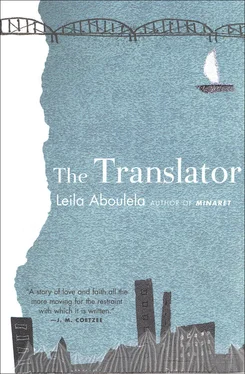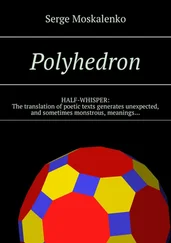‘By who?’
‘People who know the world more than me.’
‘But I trust you,’ he said. ‘You make me feel safe. I feel safe when I talk to you.’ She picked up the word ‘safe’ and put it aside, to peel it later and wonder what it meant. Sitting on the floor of the landing, she thought that this was a miracle. Not only his voice, but that happiness could come here at the foot of the stairs, the same stairs that were, once, so difficult to climb, that led to her room of hibernation, the hospital room.
On New Year’s Day, on the weekend that followed, Sammar sat at the foot of the stairs, listening to Rae. On the telephone he talked about a first night in Morocco and images come to her of a place she had never been. A decade when she was a girl and he was an adult.
The plan was that the three of them would drive the van from Edinburgh down to France, Spain, then cross the Mediterranean at Algeciras by boat to Tangiers. Rae, Steve and Chris, early twenties in the late sixties, just through with university, ready for the dope trail, ready for the dark continent. Chris wanted to drift, to break away from what, he didn’t know. He lifted weights and hated himself. While driving he blew impatiently and ruffled the long fringe that fell over his eyes. Steve kept the peace, believed in friendship and love, was one of the few people that Chris didn’t hate. Steve wanted to go to India, North Africa was a compromise for him, a gracious accession to the wishes of the other two.
In the van Rae rambled on about The Republic and Das Kapital, about Livingstone, about Richard Burton, the African explorer and translator of the Arabian Nights. About a long-lost Uncle David he had in Egypt, African cousins. Names that he knew, as cities and towns passed by, Fidel Castro, Golda Meir, Haile Selassie, Franz Fanon and the anti-colonial struggle.
‘My hero Malcolm X, I heard that man speak at the LSE, I went down… the way he gripped the audience…’
‘Shut it, will you!’
‘Shut up!’
He would not shut up. It took him years to learn the value of silence, the power of carefully chosen words. That summer his voice went on and on, a steady monotone as the van made its way through England, through the countryside of France, the sunshine of Spain. When it was his turn to drive, he talked less but it was not often his turn to drive. Chris liked to be the one driving, being a passenger bored him. Rae only shut up completely when he was reading or listening to his crackling transistor radio which was tuned to the World Service. He listened intently, oblivious to his surroundings. Things were happening around the world, historical events. He kept quiet also in the rare company of girls. Girls liked Steve, he had the looks, he played the guitar. Chris did stupid things when girls were around like kicking the tyres of the van, revving the engine when they gave two Parisian hitch-hikers a ride. For Chris life was a rubber band wound tight around him. He bickered with Rae all the way. And Rae goaded and teased him, gave him lectures from the back seat of the van, surrounded by the luggage, the radio, Steve’s guitar.
‘The Highlands were the first place the English colonised…’
‘Enough, Rae.’
‘… later India and Africa. They got Scottish men to pillage that place for the Empire. It was Scottish men who lost their lives…’
‘Shut up, will you.’
‘They were the foot soldiers. The ones the spears got first, the spears of the dervishes and the Fuzzy-Wuzzies. Kipling called them that in a poem. Hey Music Boy! Did you hear of the Fuzzy-Wuzzies? Chris, you illiterate buffoon, you? I still insist on the notion that anyone who hasn’t read Fanon deserves to be shot…’
Chris braked, yanked open the door of the van, got out and hauled a baffled at first and then resistant Rae on to the side of the road. The amateur weight-lifter found the resistance not difficult to overcome. It did not take long, in terms of time. The defeated Rae was left behind, by the side of the road. In the van Steve was laughing, making faces at him and gestures with his hands. To Algeciras, Rae limped the five miles, wiped the blood that trickled from his nose. He was without his precious World Service, without his books, his passport, his clothes. It was not funny. He found them waiting for him at the port. Silence was their apology. He hated them, he hated practical jokes. He could see the end coming soon, the end of this threesome. He slept in the back of the van, slept soundly while sunset and the boat floated over the Strait of Gibraltar.
Night-time and the first sight of Africa’s shore. Lights along the harbour of Tangiers, around him the tune of another language, men unconcerned with his foreignness. The boat was full of Moroccan itinerant workers returning home from France and Spain, carrying sacks and plastic bags. Some with families had loaded old cars, smelly diesels, a battered red Mercedes covered in blue canvas. Singer sewing machines, irons, refrigerators, food blenders, transistor radios. They all looked in the same direction, at the lights and shadows of Tangiers under the low African sky. Rae stood with them, more in awe, more wretched than they. He felt stale and unclean, with his shirt torn and his hair covered in dust. His nose and chest burnt from the smell of the diesel. A pattern was set from that first time. In years to come every arrival to Africa was similarly accompanied by loss or pain, a blow to his pride. Baggage disappearing, nights spent in quarantine, stolen travellers’ cheques. As if from him the continent demanded a forfeit, a repayment of debts from the ghosts of the past.

Of the years he spent in Morocco, he spoke to Sammar on the telephone from Stirling. He had by then left Edinburgh, left the house of his ex-wife’s parents, said goodbye to his daughter. Sammar felt the change in his voice. It was lighter, he was more at ease. In Stirling there were cousins and an old uncle to visit in a nursing home, the elder brother of the long-lost David. ‘Today,’ Rae said, ‘my uncle didn’t recognise me at all. Last year was better. Last year he thought I was David, and we talked a bit. I liked that.’
In Stirling, there was Dr Fareed Khalifa, educationalist and UK resident for ten years. The two of them were invited by the debating society as speakers to oppose the proposition, ‘This House Fears the Threat of Radical Islam’.
‘I said to him, “Fareed, we’re going to lose, it’s almost predetermined. They’ve even got a bottle of champagne as the prize for the best floor speaker, so they’re not thinking it will be you. If the results are less than 80 per cent in favour of the House, then we’ve done well.” And Sammar, that man looked devastated. He said, “You are defeatist, it’s my faith that I am defending and I’ll defend it with all I’ve got.”
Rae said, ‘I wasn’t too happy to be called defeatist.’
She told him he was being realistic not defeatist.
He said, ‘I’m trying not to be defeatist about this flu. Nights are the worst, sleeping makes me feverish and I can hardly breathe lying down. I should get back to my doctor in Aberdeen.’
She said, shyly, and with pauses in the middle, ‘I would not mind… if you call me in the middle of the night… if you can’t sleep.’ She, who had for years hibernated, could now hardly sleep. His voice during the day and the day-dreams at night. Dreaming, dreaming and not sleeping.
The first ring of the telephone through a dream of colours and people. She groped her way down the stairs, soft from sleep. Hoping the old woman would not wake up. It was two o’clock in the morning. Prayers to God Almighty that Lesley would not hear the ringing of the telephone, sleep deeply, soundly.
Читать дальше













